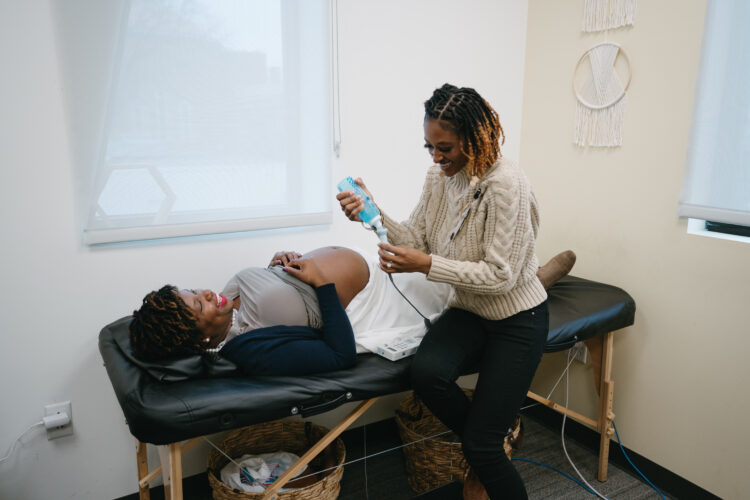A Midwife’s Solution for Bridging the Healthcare Gap for Black and Brown Families

When Ruby Jackson began her midwifery studies in the UK, she quickly noticed a glaring issue—pregnant women and gender-diverse people from Black and Brown communities, as well as their newborns, were significantly underrepresented in midwifery education and clinical training materials. Textbooks and training resources overwhelmingly featured conditions on white skin, leaving healthcare professionals without the tools to accurately assess and diagnose complications in people with darker skin tones.
This lack of representation was costing lives. Research shows that Black women are 3.7 times more likely to die during pregnancy, childbirth, or postpartum than white women, while Asian women face double the risk. Additionally, Black newborns have the highest rates of preterm birth, stillbirth, and neonatal death, according to MBRRACE-UK (2023). A 2018 study by Louie and Wilkes found that less than 5% of medical textbooks included images of conditions on darker skin tones, contributing to misdiagnosis, delays in treatment, and poorer health outcomes.
Determined to make a change, Ruby dedicated her final-year dissertation to exploring this gap in healthcare equity. She was also deeply moved by the stories she read online from Black and Brown mothers who felt invisible in maternity care. Their experiences, combined with the data she uncovered, fuelled her drive to create a practical solution—Melanatal, a smartphone app designed to bridge the gap in midwifery education and improve maternal and neonatal care for Black and Brown families.
How Melanatal is Enhancing Midwifery Education and Practice
The Melanatal app is an innovative tool that integrates medical illustrations, written clinical information, and inclusive language to improve healthcare professionals’ ability to assess conditions in pregnant women and gender diverse people, as well as newborns, with darker skin tones. It aims to support equitable maternity care by addressing disparities in diagnosis and treatment. Key benefits of the app include:
- Enhanced Clinical Knowledge: The app provides midwives, midwifery students, and other healthcare professionals with educational resources on how maternal and neonatal conditions—such as jaundice, cyanosis, and mastitis—present on darker skin tones.
- Improved Detection and Diagnosis: By offering visual aids paired with inclusive clinical language within the educational content, the app aids in the early detection and potential diagnosis of conditions that may otherwise be overlooked due to skin tone bias. This proactive approach aims to reduce delays in treatment and improve health outcomes for Black and Brown birthing people and newborns.
- Reduction of Health Inequalities: Melanatal addresses the disparities in maternal and neonatal healthcare by providing ethnically inclusive resources. This focus on representation seeks to decrease the higher rates of complications and mortality experienced by Black and Brown mothers and infants.
- Educational Resource for Clinicians and Patients: Melanatal serves as a vital tool for both healthcare providers and families, offering accessible content to improve awareness and understanding of medical conditions more prevalent among Black and Brown communities. By integrating medical illustrations with inclusive clinical language, the app enhances early recognition of key symptoms in both maternal and neonatal care.
This shared knowledge fosters timely identification and advocacy in clinical settings, empowering both parents and healthcare professionals to address potential complications more effectively. By incorporating Melanatal into practice, healthcare systems can take a significant step toward equitable and effective maternity care. With each development phase, Melanatal has the potential to transform midwifery education and practice, ultimately improving outcomes and experiences for Black and Brown families worldwide.
From Concept to Reality: The Development of Melanatal
Ruby’s commitment to addressing healthcare inequalities led her to develop Melanatal while still a student midwife. Her work has been recognised by leading healthcare and innovation programmes. After pitching her idea, she earned a place in the NHS Clinical Entrepreneur Programme, gaining access to resources and mentorship to further develop the app. She also secured a 12-month mentorship through a competition run by Amazon Web Services Healthcare, Cogniss, and The Validitron, helping to refine and validate Melanatal as a viable solution for improving maternity care.
Now in its first phase, Melanatal has been developed into a minimal viable product, with plans to pilot the app in South East England before expanding nationally and internationally. The long-term vision is to integrate the app into midwifery education and clinical practice globally, ensuring that maternal and neonatal healthcare becomes more inclusive, equitable, and effective for all.